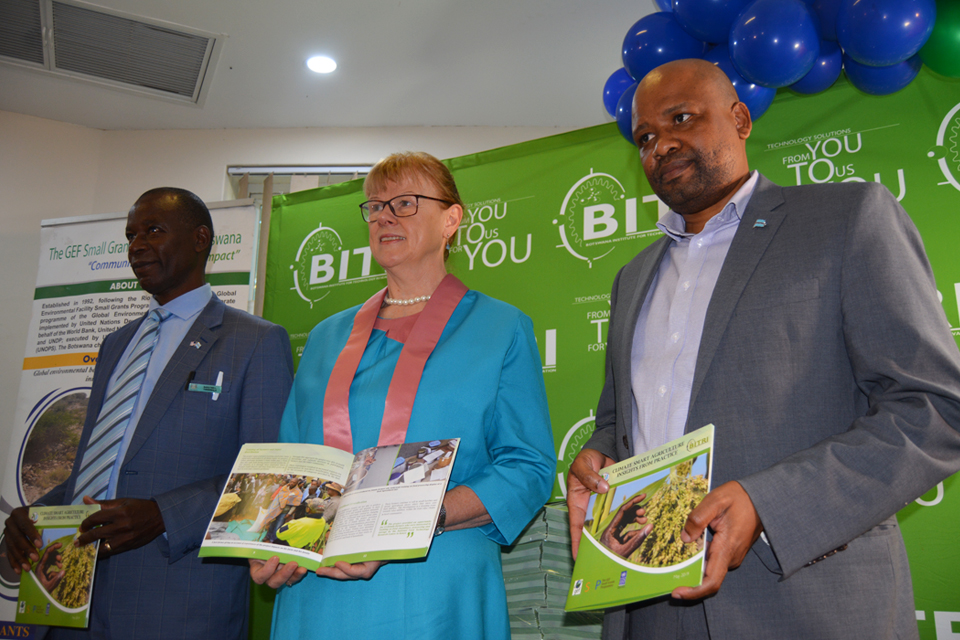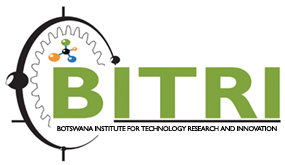September 9, 2019


BITRI, in partnership with the Ministry of Agricultural Development and Food Security and the United Nations Development Programme (UNDP) Botswana yesterday launched the Climate Smart Agriculture Lessons Learnt manual. The manual was developed with the objectives to influence national approach to programming CSA interventions that transcend any specific technology, introduce, promote and popularize CSA approaches and interventions and well as to create awareness, among the stakeholders, on the impact of Climate Change and vulnerability of agriculture and food security.
The project, which culminated in the launch of the CSA manual, was borne out of BITRI’s intention to augment Ministry of Agricultural Development and Food Security efforts to increase local food production and improve food security. The funding for the project was provided by the Global Environment Facility/ Small Grants Programme implemented by the UNDP, covering 45 smallholder farmers comprising of 29 females and 16 males from the Kgalagadi South and Barolong sub districts. In addition, 45 district agriculture managers and Extension Officers, and 500 farmers benefitted indirectly through interactions such as farm walks and filed days.
The common strain amongst presentations and discussions was that climate change is a reality, and it affects various economic sectors and facets of lives, and as such, the agricultural sector has to device means through which farmers, especially small holder farmers, whose livelihoods depended on their farming outputs, could build resilience and ability to adapt to climate change.
When delivering the Official Opening and keynote address, the United Nations Resident Representative, Her Excellency Jacinta Barrins said “I see this event as two things – first, as a celebration of the work that farmers, together with Extension officers and BITRI have put in over the last three and half years. The other element is, to create a dialogue, so that today you will all have an opportunity to ask ‘Why is that today, we are talking about conservation agriculture?’, otherwise known as smart agriculture. I want to acknowledge the Small Grants Programme and its coordinator, Ms Abigail Engleton, because this project is unique in its own right. It’s based on this premise ‘Why do we have small grants that are not more than US$50, 000… How can we have small grants that bring change? I have worked in about four countries where there was a grant, and each one of them had brought tremendous change. And what we are launching today, is an example of the transformation that amount of money can make.”
BITRI Associate Researcher Climate Change, Ms Kgomotsego Motlopi in giving the project overview acknowledged the contribution of all stakeholders.
“We [BITRI], like everybody else, is concerned about the effects of climate change. The Government of Botswana is also concerned about the same phenomenon because it affects the country’s ability to attain food security. Food security is a challenge all over Africa, and the rest of the world, so if we fail to respond to this challenge, we will not be able to produce enough food for our people. In the first year of the project, we got mixed results, with some farmers not fully-complying to the guidelines. With improved compliance, the results improved in the second year, leading to farmers not covered by the programme, expressing their interest to participate. We intentionally involved the UNDP and the Ministry of Agricultural Development and Food Security because we wanted to undertake evidence-based research that would also help us engage the said stakeholders better and for them to help us interest the farmers in the programme,” elaborated Ms. Motlopi.
The BITRI Chief Executive Officer, Prof Shedden Masupe, in the Closing Remarks, underlined the need to produce local solutions to local challenges, including developing farming technologies with the farmers.
The project identified nine key lessons as detailed in the manual, and these include viewing climate change as a development issue, considering key characteristics of the intended beneficiaries when designing interventions, viewing the farmers as innovators, considering social and cultural factors in designing programmes, factoring soil health as key to reaping the benefits of CSA, embracing farmer to farmer education to hyping interest and sustaining conversion to CSA, investment in capacitation of Extension Officers, facilitating access to seasonal weather forecasts as key to the success of CSA, as well as engaging the private sector in order to increase participation of small holder farmers.
Ms. Motlopi and Ms. Koketso Mannathoko coordinated the project and the authoring of the manual, with Prof Nyaladzi Batisani providing oversight and direction throughout the life of the project.

